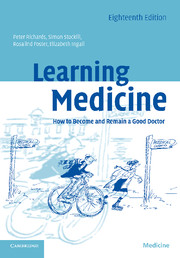Book contents
- Frontmatter
- Contents
- Foreword
- Preface
- 1 Why medicine and why not?
- 2 Opportunity and reality
- 3 Requirements for entry
- 4 Choosing a medical school
- 5 Application and selection
- 6 Interviews
- 7 Medical school: the early years
- 8 Medical school: the later years
- 9 Doubts
- 10 The new doctor
- 11 Developing your career
- 12 Career opportunities
- 13 Privileges and responsibilities: avoiding the pitfalls
- Postscript
- Appendices
- Index
5 - Application and selection
Published online by Cambridge University Press: 02 December 2009
- Frontmatter
- Contents
- Foreword
- Preface
- 1 Why medicine and why not?
- 2 Opportunity and reality
- 3 Requirements for entry
- 4 Choosing a medical school
- 5 Application and selection
- 6 Interviews
- 7 Medical school: the early years
- 8 Medical school: the later years
- 9 Doubts
- 10 The new doctor
- 11 Developing your career
- 12 Career opportunities
- 13 Privileges and responsibilities: avoiding the pitfalls
- Postscript
- Appendices
- Index
Summary
The whole emphasis of this book is to aid and encourage potential medical students to examine properly the career they are considering. This chapter deals in more detail with some of the practical “nuts and bolts” of the process of applying to and being selected by a medical school. All too often careers advice concentrates too much on these practicalities, implying the only criteria for choosing future doctors are whether they can fill out an impressive application form and get themselves selected. This detracts from the more important process of your addressing medicine's suitability as a career for you, and your suitability to be a doctor. Only after giving this serious consideration should you consider the details of application and selection set out in this chapter.
Unfortunately, the qualities which count for most in medicine are not precisely measurable. The measurable – examination performance at school – neither necessarily relates to these qualities nor guarantees intellectual or practical potential. Stewart Wolfe, an American physician, was right to ask:
Are the clearly specified and hence readily defensible criteria those most likely to yield a wise and cultivated doctor – a person capable of dealing with uncertainty, of compassionate understanding and wise judgment? Can an ideal physician be expected from an intellectual forme fuste who has spent his college years only learning the “right answers”?
Furthermore, there is no acceptable objective measure of the quality of the doctor against which to test the validity of selection decisions. In this sea of uncertainty, it is not surprising that selection processes are open to criticism.
Information
- Type
- Chapter
- Information
- Learning MedicineHow to Become and Remain a Good Doctor, pp. 66 - 75Publisher: Cambridge University PressPrint publication year: 2007
